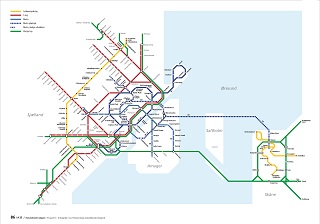The municipalities of Copenhagen and Malmö have come together to cooperate on a feasibility study for a cross-border metro system linking the two cities. This is the first step in the construction of a clean urban transport system further improving links and integration over the Őresund strait.
Cross-border metro could build capacity over Őresund strait
- 19 November 2014
A cross border Öresund metro will strengthen the integration of the two cities of Copenhagen and Malmö. It will bring benefits to their inhabitants and make the cities more competitive on an international level.
The study was conducted to plan ways of ensuring that increases in rail traffic over the Öresund Bridge do not cause a bottleneck situation in the connection between Scandinavia and the rest of Europe. A total of 30 000 people currently make use of trains on the bridge on a daily basis, and this number continues to rise.
Jointly conducted by representatives of the municipalities of Copenhagen and Malmö, the study posits that this capacity problem could be alleviated by reducing local-level rail commuting over the bridge. Based on this premise, it has conducted a socio-economic, construction and traffic engineering analysis of possible models for an integrated Öresund metro system. It concludes that a metro would be used by about 50 000 people daily by 2030, freeing up rail capacity on the bridge for longer distance travel, freight trains and reliable train connections to Copenhagen airport.
Moreover, the study suggests that significant socio-economic benefits would be brought about by the construction of a cross-border metro, as well as the ensuing greater integration of the Malmö-Copenhagen area. The time it takes to reach the city centres of the two municipalities would be reduced by about 40 %, making cross-border commutes easier, and thus leading to housing and labour market benefits in the region.
Next steps
This feasibility study has paved the way for further analysis into the environmental impact of a cross-border metro, as well as the technical considerations required for a tunnel connecting the cross-border metro with the metro system in Copenhagen. Studies on how shorter commuting times will impact on the development of the residential and labour markets of the two cities are also being conducted. This work is being carried out as a part of the Interreg programme, and is set to be completed in 2014.
Total investment and EU funding
Total investment for the project “Öresund Metro - Improved rail link capacity across the center of the Öresund Region” is EUR 1 000 000, of which the EU’s European Regional Development Fund contributed EUR 500 000 for the 2007 to 2013 programming period, under the Operational Programme “Öresund – Kattegat – Skagerrak”.

